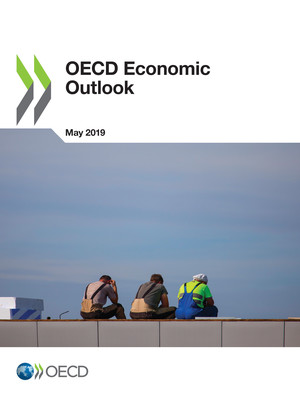copy the linklink copied!Brazil
The recovery has recently slowed despite favourable financial conditions but growth is projected to pick up to 2¼ per cent in 2020. An ambitious pension reform proposal to ensure long-term fiscal sustainability has been submitted to Congress, but uncertainty about the implementation of the reform remains. If this uncertainty dissipates, domestic demand is projected to accelerate and unemployment to decline. Given ample spare capacity, inflation is expected to remain below target.
Monetary policy will remain accommodative, supporting household spending. Without major efforts to contain expenditure growth, the sustainability of fiscal accounts remains at risk, especially but not only due to rising pension spending. Rebalancing social spending towards low-income households would reduce inequalities. Achieving stronger growth will require further reform efforts to strengthen productivity, including closer integration into the global economy and lower administrative barriers to market entry.
The expansion has shifted into a lower gear
The economy continues to recover, but the pace has ebbed, especially for investment, as all eyes are set on the ability of the new administration to deliver reforms. Business confidence has started to recede against the background of uncertainty around the reform process. Growth in the services and primary sectors has compensated for a contraction in industrial output and the prospects for agricultural output remain favourable. Inflation and core inflation are below target, despite a minor uptick in recent months, and interest rates have remained low. This, together with moderate wage growth, is supporting private consumption, although unemployment has yet to improve. In particular, the composition of jobs created has been of low quality so far, with a disproportionate number of jobs created in the informal sector. Fiscal indicators continue to deteriorate.
Improving the quality of public finances is crucial for restoring confidence
Low confidence is holding back a stronger recovery in domestic demand, and confidence will improve only with tangible progress on reforms that ensure fiscal sustainability. Gross public debt remains high at 77% of GDP and the primary deficit of 1.5% of GDP falls short of the estimated 2% surplus required to stabilise public debt. The expenditure rule introduced in 2016 will not be met in 2020 without implementing decisive action to reduce the growth of public spending.
While some progress has been made on other expenditure items, the deterioration in the fiscal accounts continues to be driven by rising social security expenditures, most notably old-age pensions. Therefore, pension reform, along the lines of the proposal submitted to congress, remains the key priority to ensure debt sustainability, restore investor confidence and avoid higher financing costs.
The reform proposal would also improve the redistributive impact of pensions and allow for a recalibration of social spending towards more effective social benefits. Due to an indexation to the minimum wage, rising pension benefits have benefitted mostly middle-class households, leaving fewer resources for well-targeted social benefits to fight inequality and poverty, which is concentrated among children and youth. Raising income thresholds in the conditional cash transfer programme Bolsa Família, which costs only 0.5% of GDP, would broaden eligibility and raise benefit levels. This would lift more people out of poverty and strengthen incentives for school attendance and medical check-ups, thus reducing inequalities with respect to education and health.
Reducing the public sector’s high wage bill is also a key priority, as salary levels exceed private sector pay in many areas, particularly at the entry level. However, the recently decided rise in military remunerations is likely to make the case for savings in other parts of the administration more difficult. Efforts to reduce tax expenditures and credit subsidies for private-sector enterprises, which have created fertile grounds for corruption without generating clear benefits for either well-being or productivity, should continue.
With inflation projected to be below target in 2019 and 2020, monetary tightening now appears unlikely before 2020 and financial conditions are projected to remain favourable. Credit has been growing for households, but continues to decline for the corporate sector. Current reform plans to strengthen competition in the financial sector are a promising step to reduce borrowing costs.
Productivity growth will be the main engine of growth in the longer term. Strengthening it will require more competition in many sectors to allow labour and capital to move to activities with strong potential. Closer integration into the global economy would raise efficiency by exposing more firms to foreign competition and improving access to lower cost intermediate and capital goods. Efficiency would also be enhanced by reducing domestic barriers to entry and implementing policies to reduce costs, such as easing tax compliance or improving contract enforcement. A substantial overhaul of the fragmented indirect tax system, with a view towards a unified value added tax, could raise the competitiveness of firms across the country.
Growth is projected to gain momentum
On the assumption of a successfully legislated and implemented pension reform and the associated confidence improvement, growth is projected to increase during 2019 and 2020 and unemployment to decline, including through the creation of more jobs in the formal sector. Low inflation, stronger wage growth and falling unemployment will support private consumption and investment will rise visibly during 2019 as the reforms advance. Structural reforms beyond pensions will support stronger growth momentum in 2020.
Risks are mainly related to the implementation of reforms. The fragmented political landscape, and at times the challenging relationship between different branches of government, is making it difficult to build political consensus for key reforms. If congress fails to approve the ambitious reform agenda of the executive, the expenditure rule would be violated as early as 2020, likely resulting in higher financing costs, lower growth outcomes and possibly a return into recession. On the other hand, a stronger reform momentum stretching beyond the urgently needed pension reform could improve the business climate significantly and lead to stronger growth, including exports. The possibility of rising trade tensions also bears risks for Brazil, as China and the United States are Brazil’s two major trading partners.





